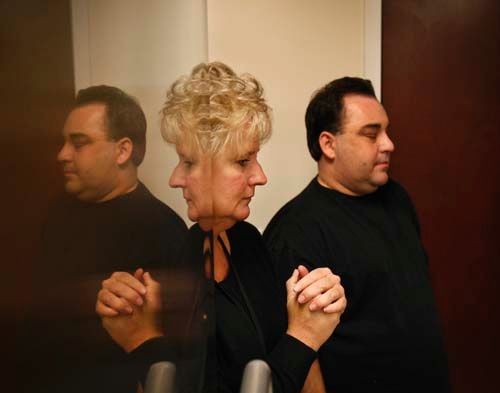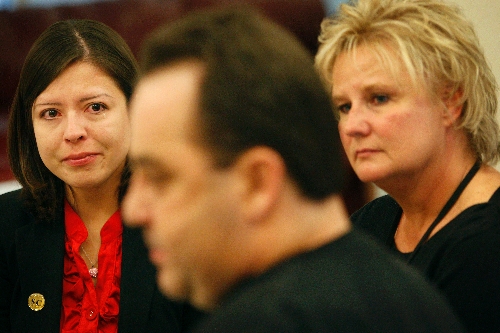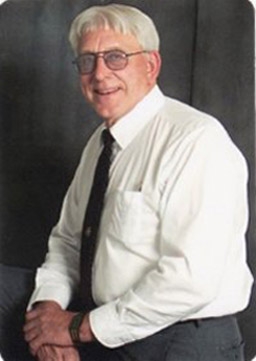Witnesses recall U.S. courthouse shooting one year ago in Las Vegas




It was the start of a new work week, the start of a new year.
On the morning of Jan. 4, a Monday after a long holiday weekend, all kinds of professionals were returning to work at the Lloyd George U.S. Courthouse in downtown Las Vegas.
Judges. Clerks. Attorneys. Law enforcement officers.
But this would be no ordinary day, no ordinary year, for those caught in the crossfire that cool winter morning.
"There’s not a day that goes by that I don’t think about that day," said Nick Driscoll, who owns the cafe on the building’s first floor.
Driscoll was one of several people who took cover in the cafe that day when Johnny Lee Wicks entered the courthouse just after 8 a.m. and opened fire with a 12-gauge shotgun. The first shot hit court security officer Stan Cooper, who fell to the floor and died.
On a recent afternoon, Driscoll and other survivors gathered in the cafe to reflect on the upcoming anniversary of that terrifying event, which ended when Wicks was fatally shot across the street.
"There’s anniversaries that you’re proud of, and then there’s ones that you wish never happened," Driscoll said. "And this is one that you wish never happened."
While Driscoll and others who were in danger that morning have suffered as a result of their experiences, many also say the incident has had positive effects on their lives and on the entire "courthouse family."
"I think the whole building united after this happened," Driscoll said.
He also said he has become "more focused" in his actions. The cafe owner, who is legally blind, said he started advocating for the disabled.
"I wouldn’t have done that before," he said.
Denise Saavedra, a court recorder and devout Christian who comforted Cooper as he died, said her "heart has changed" since the shooting.
"I started praying for more people," she explained as she sat with Driscoll in the cafe. "I want everyone saved."
And she now realizes that she doesn’t know when someone in her life will die.
"We don’t wait till someone dies to appreciate them," added Driscoll, who on the day of the shooting led Saavedra to his cafe after finding her with Cooper.
Assistant U.S. Attorney Kathleen Bliss, who entered the lobby moments after Cooper was shot, said she always has tried to see the best in everyone.
"But now, instead of trying to see the best in every person, I also try to look for connections we all have with each other as human beings," she said. "I really try to never lose an opportunity to appreciate the humanity that we all share."
Bliss had passed Cooper many times over the years, but she did not know his name or that he was a Tulsa native.
"If I have any regrets, it would be that I had never asked Stanley about his accent or figured out where he was from," Bliss said.
Bliss, who has worked in Las Vegas for 10 years, said both she and Cooper began their careers in Tulsa — she as a prosecutor and he as a police officer — but she didn’t discover their shared background until he was gone. She remembers Oklahoma as a place where "people really cared about each other, and your community was your family."
"I really do believe Stanley, being a good Okie, would like it that way — for there to be something positive, for people to care more about each other, for people to appreciate the things that we have in common with each other," Bliss said.
Bliss was climbing the stairs from the building’s underground parking garage when she heard banging noises in the lobby.
"It sounded like boxes falling," she recalled.
She kept walking. She heard yelling but kept going, assuming the court security officers at the front entrance were just joking around.
"And literally right in front of my feet, I look down and I see a shotgun shell casing," Bliss said.
Again, she assumed incorrectly: that someone had dropped boxes with evidence from a gun case.
"I had absolutely no concern whatsoever that anything bad had happened," she said.
At that moment, a court security officer ran by and gestured with his thumb toward a frosted glass window on the west side of the building.
"I look over at the window, and I can see shadows," Bliss said.
Then she heard gunshots. To get away from the window, she ran past the public entrance metal detectors and through the rotunda, where Saavedra was on the floor with Cooper.
"I’m looking at her, and she’s terrified — I can tell," Bliss said. "I’m terrified."
Soon after, Driscoll led both Bliss and Saavedra to the cafe.
Brian Christensen, a law clerk for Chief U.S. District Judge Roger Hunt who now lives in Washington, D.C., was there, too. He was bleeding.
Later, Christensen said he had just passed through security when he heard what he thought was a bomb blast. Next came what he knew were two gunshots.
As Christensen ran toward the cafe, he felt pain in his hand and saw blood. He believes his wounds, on the hand, the crown of his head and his back, were grazes from shotgun pellets.
Assistant U.S. Attorney Nick Dickinson had just stepped onto the long plaza leading to the courthouse entrance when he heard a bang.
"It was all very fast and surreal," he said recently.
Dickinson looked up and saw a man in a trench coat pointing a shotgun toward the building’s entrance.
Then he heard a gunshot — in his direction.
"You can just tell when something’s coming your way," Dickinson said.
He crawled down the stairs to an employee parking lot on the north side of the building and told other people there to get down.
"Then it was like an all-out TV firefight for about 30 seconds," Dickinson recalled.
When the shots ended, he used his BlackBerry to e-mail his wife and his parents to assure them he was safe.
"I knew right away that this would be a big story that would hit the press right away," he said.
Dickinson said he knew Cooper by his first name and talked to him daily. The security officer’s death has affected Dickinson more than any other aspect of that morning.
"I’m more than a part-time Catholic," the prosecutor said. "It does make you think that you’re lucky to be here. You’ve got to take advantage of the time that you have here, because you never know what’s going to happen."
Saavedra said she still jumps when she hears a loud noise, but God has given her strength in the past year.
Recently, she heard the song "Safe" by Phil Wickham on the radio. She was feeling down that day and believes the song was God’s way of lifting her up.
It was the song she was listening to as she parked last January, and the lyrics — "you will be safe in his arms" — kept coming back to her that day. Later she met Wickham at a Christian conference, and told him how God had used his song to reach out to her.
"It was just really nice to get to meet the person who wrote that song," she said.
Driscoll and his cafe manager, Robin Gulli, said Saavedra has given them strength since the day they all huddled together in the cafe. She frequently posts uplifting messages on Facebook.
"If you’re ever down and look at one of her posts, you’re OK," Driscoll said.
"She’s just right on," Gulli added.
Saavedra is Senior U.S. District Judge Lloyd George’s court recorder. On Jan. 4, she entered the courthouse at the same time as Christensen and, like Bliss, she thought boxes were falling to the floor. Security officer Jack Eklund pulled Saavedra to safety, and she found herself at Cooper’s side as he took his last breaths.
"She was in the brunt of it, and she’s doing better than all of us," Driscoll said.
Saavedra took a few days off after the incident, but Gulli and Driscoll returned to work when the building opened the next day.
"We felt like we had to be strong for everybody coming back in here," Gulli said.
"The healing had to start somewhere," Driscoll added.
Saavedra recently received an award from the director of the Administrative Office of the U.S. Courts for her "extraordinary actions" that day. Bliss calls Saavedra her "angel."
Bliss didn’t want to return to work the day after the shooting, but her husband, who worked in law enforcement for 35 years, told her, "You have to."
"He’s a survivor, and he knows that I am, too," Bliss said. "I think he was just trying to keep me strong, and by me being strong, it would just add to the support and the connectivity of all of us who had been through that."
The memory caused her eyes to well up with tears. "God, I was not going to cry," she remarked.
Bliss did return to work the next day.
She said representatives of the Justice Department did everything they could to address employees’ health and welfare after the shooting.
"It made me so proud to be part of the courthouse family," Bliss said.
She also has nothing but praise for the actions of the security and law enforcement officers.
"I had no idea what superstars they were," she said.
Judge George, who was driving to the courthouse when he learned of the shooting, doesn’t think anything could have been done to prevent Cooper’s death.
"I think we were very lucky that we just lost one person because it could have been any number of people," he said.
Contact reporter Carri Geer Thevenot at cgeer@reviewjournal.com or 702-384-8710.












